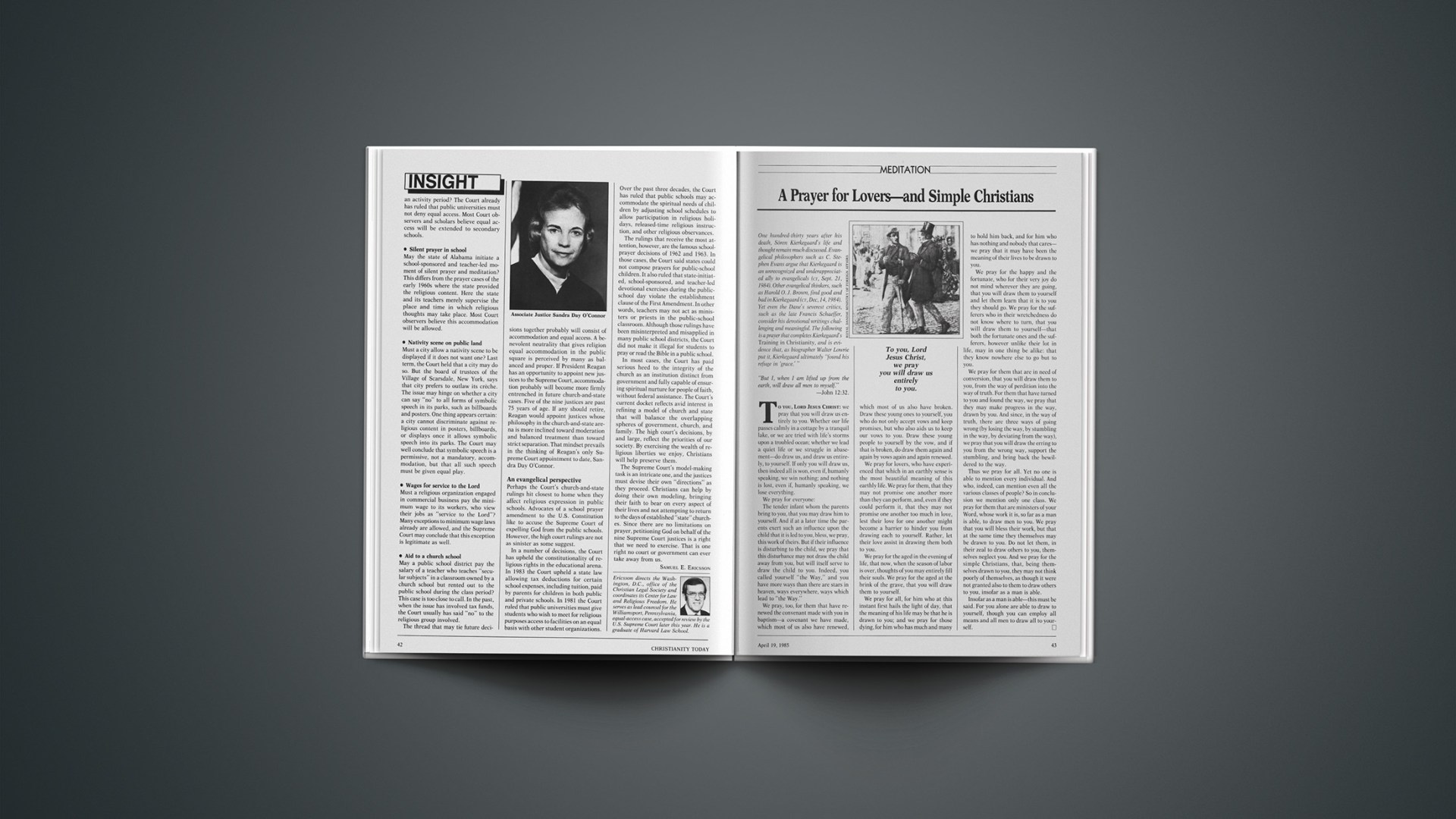One hundred-thirty years after his death, Sören Kierkegaard’s life and thought remain much discussed. Evangelical philosophers such as C. Stephen Evans argue that Kierkegaard is an unrecognized and underappreciated ally to evangelicals (CT, Sept. 21, 1984). Other evangelical thinkers, such as Harold O. J. Brown, find good and bad in Kierkegaard (CT, Dec, 14, 1984). Yet even the Dane’s severest critics, such as the late Francis Schaeffer, consider his devotional writings challenging and meaningful. The following is a prayer that completes Kierkegaard’s Training in Christianity, and is evidence that, as biographer Walter Lowrie put it, Kierkegaard ultimately “found his refuge in ‘grace.’ ”
“But I, when I am lifted up from the earth, will draw all men to myself.”
—John 12:32.
To you, Lord Jesus Christ: we pray that you will draw us entirely to you. Whether our life passes calmly in a cottage by a tranquil lake, or we are tried with life’s storms upon a troubled ocean; whether we lead a quiet life or we struggle in abasement—do draw us, and draw us entirely, to yourself. If only you will draw us, then indeed all is won, even if, humanly speaking, we win nothing; and nothing is lost, even if, humanly speaking, we lose everything.
We pray for everyone:
The tender infant whom the parents bring to you, that you may draw him to yourself. And if at a later time the parents exert such an influence upon the child that it is led to you, bless, we pray, this work of theirs. But if their influence is disturbing to the child, we pray that this disturbance may not draw the child away from you, but will itself serve to draw the child to you. Indeed, you called yourself “the Way,” and you have more ways than there are stars in heaven, ways everywhere, ways which lead to “the Way.”
We pray, too, for them that have renewed the convenant made with you in baptism—a covenant we have made, which most of us also have renewed, which most of us also have broken. Draw these young ones to yourself, you who do not only accept vows and keep promises, but who also aids us to keep our vows to you. Draw these young people to yourself by the vow, and if that is broken, do draw them again and again by vows again and again renewed.
We pray for lovers, who have experienced that which in an earthly sense is the most beautiful meaning of this earthly life. We pray for them, that they may not promise one another more than they can perform, and, even if they could perform it, that they may not promise one another too much in love, lest their love for one another might become a barrier to hinder you from drawing each to yourself. Rather, let their love assist in drawing them both to you.
We pray for the aged in the evening of life, that now, when the season of labor is over, thoughts of you may entirely fill their souls. We pray for the aged at the brink of the grave, that you will draw them to yourself.
We pray for all, for him who at this instant first hails the light of day, that the meaning of his life may be that he is drawn to you; and we pray for those dying, for him who has much and many to hold him back, and for him who has nothing and nobody that cares—we pray that it may have been the meaning of their lives to be drawn to you.
We pray for the happy and the fortunate, who for their very joy do not mind wherever they are going, that you will draw them to yourself and let them learn that it is to you they should go. We pray for the sufferers who in their wretchedness do not know where to turn, that you will draw them to yourself—that both the fortunate ones and the sufferers, however unlike their lot in life, may in one thing be alike: that they know nowhere else to go but to you.
We pray for them that are in need of conversion, that you will draw them to you, from the way of perdition into the way of truth. For them that have turned to you and found the way, we pray that they may make progress in the way, drawn by you. And since, in the way of truth, there are three ways of going wrong (by losing the way, by stumbling in the way, by deviating from the way), we pray that you will draw the erring to you from the wrong way, support the stumbling, and bring back the bewildered to the way.
Thus we pray for all. Yet no one is able to mention every individual. And who, indeed, can mention even all the various classes of people? So in conclusion we mention only one class. We pray for them that are ministers of your Word, whose work it is, so far as a man is able, to draw men to you. We pray that you will bless their work, but that at the same time they themselves may be drawn to you. Do not let them, in their zeal to draw others to you, themselves neglect you. And we pray for the simple Christians, that, being themselves drawn to you, they may not think poorly of themselves, as though it were not granted also to them to draw others to you, insofar as a man is able.
Insofar as a man is able—this must be said. For you alone are able to draw to yourself, though you can employ all means and all men to draw all to yourself.










